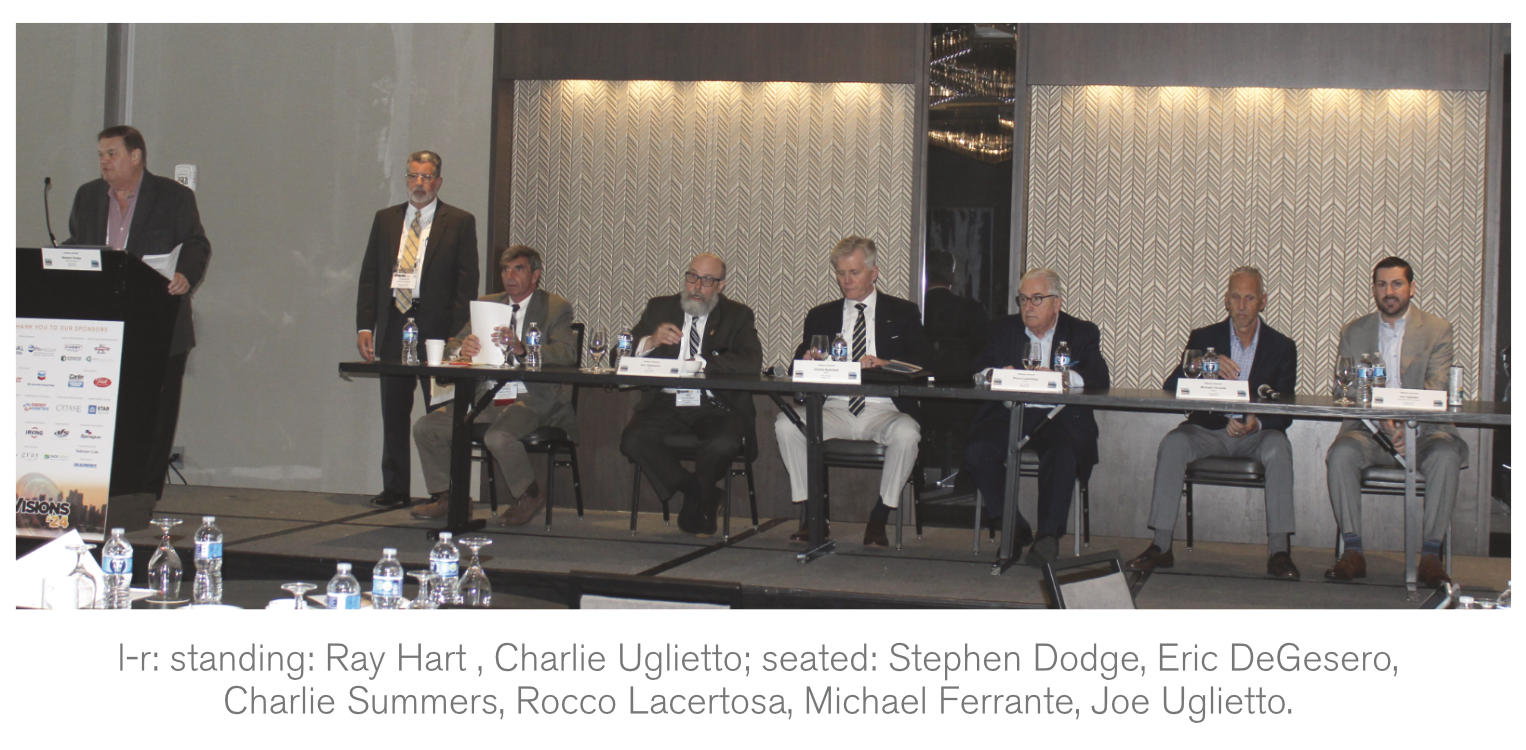The Industry Summit at Visions Conference ’24 focused on the successes of the past six years, kicking off the conference with a blockbuster announcement: The Heating Oil Industry is on Track to Achieve Net-Zero Emissions by 2050.
At the very first Industry Summit, industry leaders committed to reducing greenhouse gas emissions by 15 percent by 2023, 40 percent by 2030, and reach net-zero carbon emissions by 2050. The following year, studies showed that the way to reach these goals was to embrace renewable liquid heating fuels (RLHF), aiming for widespread use of B20 by 2023, B50 by 2030 and B100 by 2050.
According to a new analysis by Dr. Tom Butcher of the National Oilheat Research Alliance (NORA), the industry has surpassed its goal of reducing GHGs 15 percent by 2023, achieving a nearly 26 percent reduction in greenhouse gas emissions through a combination of energy efficiency improvements and increased use of renewable fuels such as Bioheat® Fuel. According to Dr. Butcher, equipment efficiency has led to an estimated 16.8 percent reduction in GHG emissions through lower fuel consumption, and the increased use of biodiesel blends has reduced another 11 percent, resulting in an overall 25.6 percent reduction. In order to meet the 2030 goals, most RLHF blends should be at least 29 percent biodiesel.
That was just the start. Throughout the Summit sessions, Tuesday morning and Wednesday afternoon, industry leaders and association executives highlighted other successes, including:
- UL standards that recognize higher biofuel blends in oil-fired heating equipment.
- Manufacturers introducing burners and heating systems to the market that are certified for blends of up to 100 percent biodiesel (B100).
- New federal tax credits for homeowners who upgrade to more efficient oil-fired furnaces and boilers that are designed for use with higher blends of renewable fuels.
- Securing federal grants for downstream biofuel infrastructure investments for heating oil.
Much was made of the fact that six years ago, heating oil customers were considered the “low hanging fruit” for system conversions, and today the renewable liquid heating fuels industry has a seat at the table when decisions are being made. Renewable fuels are being recognized as the accessible, lower carbon solution for immediate carbon reductions.
Michael Ferrante, President of Massachusetts Energy Marketers Association, thanked Paul Nazzaro of Advanced Fuel Solutions and Clean Fuels Alliance America for his 25 years as “a champion, a warrior,” for renewable fuels.
At the full Summit Session on Wednesday, May 1, Stephen Dodge, Director of State Regulatory Affairs, Clean Fuels Alliance America, led a “fireside chat” with industry executives Eric DeGesero, Fuel Marketers Association of New Jersey; Charlie Summers, Maine Energy Marketers Association; Rocco Lacertosa, New York State Energy Council; Michael Ferrante, Massachusetts Energy Marketers Association; and Joe Uglietto, Diversified Energy Specialists. Matt Cota, of Vermont Fuel Dealers Association, joined by way of a pre-recorded video. These executives agreed that the most pressing issues were the waves of “clean fuel” standards and cap-and-invest regulations that were being finalized, and – even more concerning – the uncertainty of what they would entail once enacted. These electrification plans will increase the cost of liquid fuels. Many have stated that the goal is to make liquid fuels too expensive for consumers to buy or retailers to market.
The Summit concluded with a luncheon and keynote presentation by Travis Fisher of the Cato Institute. Fisher, who usually works on wholesale electricity policy noted his appreciation of the audience’s work to keep our communities “warm and safe.”
Fisher spoke of the importance of a “resilient grid that can handle bad weather,” and that in the Northeast, a destabilized, all-electric market is a “life or death question when the weather goes bad and stays bad.”
“The central planner class in D.C. has lost sight of its effect on home owners. They sold something too good to be true: ‘Green the grid and electrify everything,’ as if it were that easy,” he told the crowd. Fisher then referenced a Wall Street Journal editorial that theorized that when demand growth meets supply constraints, we will be looking at some form of rationing either through increased prices or “categories of energy use being demonized.”
Charlie Uglietto, President of Cubby Oil, closed the session by noting that, “The industry is changing. Fuels are changing. Regulations are changing. If we know what we’re up against, we can move forward. We don’t do it as retailers alone. We do it with equipment manufacturers and wholesale suppliers. The key is that nothing has been set in stone yet. The fight is not over. Support your associations and be active and vigilant. We can use our seat at the table to bring common sense to legislators and consumers.”



